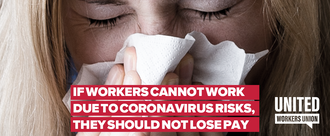- Featured
- Asylum Seekers and Migrants
- Climate and Environmental Justice
- Disability Justice
- Economic Justice
- Education
- First Nations Justice
- Health and Medicare
- International Solidarity
- LGBTIQA+ Rights
- Media and Arts
- Occupational Health and Safety
- Public Services
- Public Transport
- Racial Justice
- Social Justice
- Women's Rights
- Workers' Rights
- More
-
COVID-19 - Call time on Term 1Our union’s primary concern is that schools cannot currently meet either their legislative Work, Health and Safety (WHS) obligations or their duty of care to both their employees and students while the school term continues.5,932 of 6,000 SignaturesCreated by Independent Education Union Qld & NT
-
Help save lives and low the cost of living for low income earnersPeople are dying in govt state homes due to not being able to control there body temperature because the Qld state government won’t install air conditioning into government housing. https://youtu.be/t-o-4xXMoM8 Also it’s unfair that homeowners are paying next to nothing for electricity because of solar panels and the Qld state is giving them all the rewards. For equality the low income earner should also be entitled to this as well. For those who are homeowners please read the article because there’s something in there for you that will also benefit you. Thank you and keep safe. https://youtu.be/Htfbo3A6BzQ http://3quotes.com.au/news/3-int-13-geo/index.html10 of 100 SignaturesCreated by Tony Potter
-
Coronavirus - A guaranteed wage subsidy to save jobs now!Working Australians have been dealt a body blow by the impact of the coronavirus. Millions of workers are facing the very real prospect of losing their job and they need the government to act. Sign our petition and tell the Morrison government it must provide a guaranteed wage subsidy to all working people immediately to save jobs. Other countries' governments have already done this. The UK government is guaranteeing 80% of people's wages. It’s time Scott Morrison gave Australian workers the same assurance that they are not being abandoned. Scott Morrison has announced a wage subsidy for Australian workers, but it excludes 500,000 casuals and over 1 million temporary visa holders. Let the Prime Minister know that it is only by keeping people in jobs that the future of Australian workers, their families and their communities can be secured. If we guarantee wages now we will keep people in jobs and out of welfare. Sign the petition for a guaranteed wage subsidy and let Scott Morrison know Australian workers need a government that puts the well-being of workers first.44,367 of 45,000 SignaturesCreated by Australian Unions
-
Stop the privatisation of SA PathologyWhen there's a crisis, we can only rely on public pathology and health services to protect the community. Thanks to our world class public pathology service, South Australia is testing more people for COVID-19 than any state. Tell Steven Marshall to keep South Australians healthy, and rule out any plans to privatise SA Pathology now!4,156 of 5,000 SignaturesCreated by Public Service Association of SA
-
COVID-19: Students Demand Government ResponseThe COVID-19 crisis has highlighted the social inequality many young people have experienced for too long. While the world tries to manage an unfolding pandemic, this crisis has led to insecurity in housing, income, and study without action from our government. This crisis will affect all aspects of the lives of students and young people. Casual workers, most of whom are students, have no guarantee that they will get paid if their workplace is to shut down or they must self-isolate. Working people need to know they don’t have to make the decision between going to work sick, or self-isolating and not being able to pay their bills. At Universities, our campuses are closing and moving online, while ongoing fears about fees and future of study, especially for international students, remain unaddressed. So many questions remain unanswered, but what we know is that if this continues, bills will stack up, evictions will occur, and income support payments will be lost. In its silence, our government is finalising a generation of inequality for today’s young people. As they move towards announcing their second stimulus package, young workers and students are begging for support. The Morrison government is yet to respond to our concerns. Instead, focusing on lining the pockets of business and giving out one off welfare payments that will fail to bring students out of poverty. Students and young people cannot continue to be left behind. This statement is endorsed by dozens of student representatives from around the country, representing hundreds of thousands of students whose livelihoods and futures are under threat. We are demanding action. The government must finally take leadership during this crisis and support the Australians who have been forgotten. Workers, students, and young people need action to protect their income, housing, and study. To fail at this now will hurt this nation for years to come.319 of 400 SignaturesCreated by Zoe Ranganathan, NUS President
-
Clubs Workers need urgent paid leave and ongoing support!We need this government to step up and ensure all workers who are unable to work because of Coronavirus have access to special paid leave, and are not left out of pocket.801 of 1,000 SignaturesCreated by United Workers Union Clubs members
-
Ensure all information regarding the COVID-19 pandemic is translated by qualified professionalsRight now all of Australia is concerned about containing the COVID-19 coronavirus and we need to make sure everyone has access to the necessary information. For our CALD communities, which includes the Deaf community, this means accurate translation and interpretation of information about the Coronavirus. It’s their right to know how to keep themselves safe. And it’s everyone’s safety too. If they’re denied access to information, they may – through no fault of their own – contribute to the spread of the virus.485 of 500 SignaturesCreated by Professionals Australia
-
Coronavirus: Sick & Closure Pay for Casual Teachers & ES StaffIf Casual Relief Teachers or Casual Education Support staff are sick or required to self-isolate they will not get sick pay. This puts real pressure on our colleagues to come to work sick. If schools are required to close they will not be paid. Public health is not an individual responsibility, it is a social responsibility.108 of 200 SignaturesCreated by Chris Breen
-
Coronavirus: Don’t make uni staff pay!No university worker should be forced to choose between quarantine and feeding their family. The Coronavirus Covid-19 crisis is engulfing Australia - and our universities are in the eye of the storm. Right now, job security is health security and we need university Vice-Chancellors to do the right thing by staff, students and the public. That means securing our rights at work so we can protect our health at home. No-one can predict how long this crisis will continue - perhaps weeks or months. That's why we need to lock in firm commitments from university employers now to keep things fair, and keep us safe.12,574 of 15,000 SignaturesCreated by Steve Adams and Amy Thomas, NTEU members
-
Home care & disability workers need paid leave & protective gear to stop the spread of COVID-19!The lives of thousands of Australians hinge on our government taking immediate action by guaranteeing paid leave and protective equipment for all home care & disability support workers.477 of 500 SignaturesCreated by United Workers Union
-
Help Aged Pensioners shop in PeaceThere is Lots of Panic Buying in our Supermarkets at this time of need. Lots of people are scared about COVID-19 Virus, i feel our Elderly are being left behind when trying to shop for their everyday items. If all Supermarkets were open one hour earlier on this Pension Day 19-03-2020 our Elderly could shop in Peace, and be able to secure their Everyday Items before the panic Buyers Entered the store. It would a safe haven for our Elderly who are most Vulnerable to the COVID-19 Virus.6 of 100 SignaturesCreated by Pete OBrien
-
Clean Schools: Keep your kids safeSchool cleaners don’t have enough time to do their job because of cuts to cleaning hours by the NSW Government. Cleaners want to ensure your kids are safe but simply don’t have enough time to do the job they want to do.1,202 of 2,000 SignaturesCreated by United Workers Union












